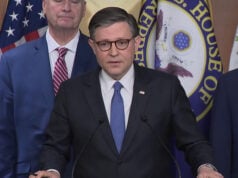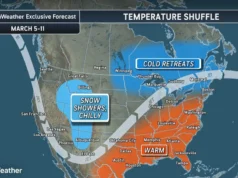
Gov. Ron DeSantis just signed a sweeping new measure aimed at accelerating hurricane recovery, fortifying communities and enhancing government coordination ahead of future storms.
Proponents say it will improve how the state and localities plan before and after natural disasters while helping homeowners to rebuild with clear, streamlined permitting resources.
Critics contend that while well-intentioned, the legislation lacks key details and overly preempts local land and growth management.
The measure (SB 180), effective immediately, outlines more than a dozen changes to Florida’s emergency response laws, from post-storm permitting and debris management to disaster spending transparency and local land use regulations.
It creates new obligations for state and local governments and agencies while prohibiting certain regulatory practices in disaster zones.
Local governments are now barred from imposing construction moratoriums or adopting land-use restrictions for one year following a hurricane if they are located within 100 miles of the storm’s track and covered by a federal disaster declaration.
That provision applies retroactively to Aug. 1 and remains in effect until Oct. 1 for Hurricanes Debby, Helene and Milton.
The law allows residents and business owners to sue local governments over any ordinance or development regulation they deem “burdensome or restrictive” during the recovery period. A successful challenge can result in injunctive relief and attorneys fees.
Further, SB 180 requires cities and counties to adopt post-storm permitting plans, designate emergency contacts, expedite rebuilding procedures and publish guides for residents detailing recovery processes, flood risks and shelter availability.
It also prohibits building departments from raising inspection or permit fees for 180 days after a state of emergency declaration and forbids “lookback” ordinances — local regulations that require older structures to be brought up to current building standards when renovations or repairs are made — in municipalities participating in the National Flood Insurance Program (NFIP).

“We’re fighting for families to focus on rebuilding without additional delays or burdens, especially for those who sustained damage or lost their homes. Working with our state and local emergency responders, we can streamline restoration efforts and improve emergency response coordination, fortifying and strengthening our communities before the next storm,” said Indian Rocks Beach Republican Sen. Nick DiCeglie, who sponsored SB 180.
Speaking on the Senate floor in April, DiCeglie said he was inspired to file the measure after seeing the devastation that Helene and Milton wrought and how much his constituents struggled to survive and rebuild.
“After a storm, Floridians need a clear path to recovery,” he said. “When local bureaucracy overshadows the needs of citizens, Floridians are left picking up the pieces.”
For state agencies, SB 180 imposes additional responsibilities. The Department of Emergency Management must submit annual reports on emergency spending, develop new shelter capacity planning and institute biennial training sessions for county and municipal personnel.
It also prioritizes the use of Hurricane Loss Mitigation Program funds for shelters in counties with shelter deficits and for publicly owned, non-school projects. Beginning next year, the Department of Emergency Management must also post emergency contracts on the state’s secure contract-tracking system and report on federal disaster assistance disbursement procedures.
The Department of Environmental Protection (DEP) must also now maintain a new statewide “Flood Inventory and Restoration Report” — updated every two years — to identify risks, inspection schedules and funding priorities.
DEP must also collaborate with the Department of Emergency Management to recommend changes to the permitting process for rebuilding storm-damaged structures.
Other notable provisions include allowing Florida National Guard medics to treat civilians during emergencies and requiring the Department of Veterans Affairs to share special needs shelter registration information with caregivers.

The post Gov. DeSantis signs hurricane recovery law that preempts local land use authority appeared first on Florida Politics – Campaigns & Elections. Lobbying & Government..
Disclaimer
Artificial Intelligence Disclosure & Legal Disclaimer
AI Content Policy.
To provide our readers with timely and comprehensive coverage, South Florida Reporter uses artificial intelligence (AI) to assist in producing certain articles and visual content.
Articles: AI may be used to assist in research, structural drafting, or data analysis. All AI-assisted text is reviewed and edited by our team to ensure accuracy and adherence to our editorial standards.
Images: Any imagery generated or significantly altered by AI is clearly marked with a disclaimer or watermark to distinguish it from traditional photography or editorial illustrations.
General Disclaimer
The information contained in South Florida Reporter is for general information purposes only.
South Florida Reporter assumes no responsibility for errors or omissions in the contents of the Service. In no event shall South Florida Reporter be liable for any special, direct, indirect, consequential, or incidental damages or any damages whatsoever, whether in an action of contract, negligence or other tort, arising out of or in connection with the use of the Service or the contents of the Service.
The Company reserves the right to make additions, deletions, or modifications to the contents of the Service at any time without prior notice. The Company does not warrant that the Service is free of viruses or other harmful components.












